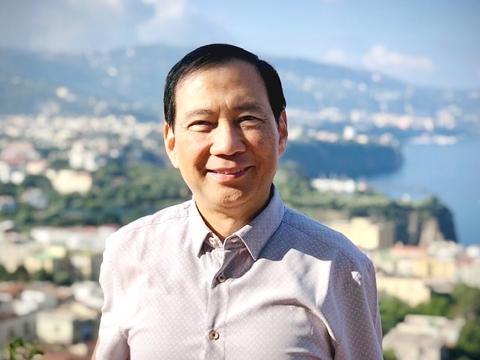National Taiwan University (NTU) has announced that professor Chen Pi-sin (陳丕燊) has been named a Blaise Pascal Chair for his research into simulated black holes.
Chen, who is director of the Leung Center for Cosmology and Particle Astrophysics at the university, said the chair would enable him to continue his research into black holes.
He has over the past year worked with Nobel Prize in Physics laureate Gerard Mouru on an experiment both had proposed in the paper “Accelerating Plasma Mirrors to Investigate the Black Hole Information Loss Paradox,” published by Physical Review Letters in January last year.

Photo courtesy of National Taiwan University
The two are exploring what is known to as the black hole information paradox, namely whether physical information would continue to exist when it is devoured by a black hole.
The premise of the experiment hypothesized that Albert Einstein’s theories of general and special relativity could be paradoxical with quantum mechanics, Chen said.
“With the use of lasers, plasma targets with density gradients and relativistic plasma mirrors, we have created an environment analogous to the late-time evolution of black hole Hawking radiation,” Chen said.
Chen is to be invited to conduct further experiments at Ecole Polytechnique in Paris, where he would have access to the Laboratoire pour l’Utilisation des Lasers Intenses, the university said.
The Blaise Pascal Chair, named after one of the first two inventors of the mechanical calculator, was conceived in 1996 by the government of the Ile de France region, which surrounds Paris, to invite prestigious academics to visit and study.
The laureate of the Blaise Pascal Chair is considered an extremely prestigious position.
Of more than 90 chair recipients over the years, five have been Nobel Prize winners.
Nominees are chosen every year by a scientific committee from outstanding scientists around the world in a wide range of disciplines.
Additional reporting by CNA

Alain Robert, known as the "French Spider-Man," praised Alex Honnold as exceptionally well-prepared after the US climber completed a free solo ascent of Taipei 101 yesterday. Robert said Honnold's ascent of the 508m-tall skyscraper in just more than one-and-a-half hours without using safety ropes or equipment was a remarkable achievement. "This is my life," he said in an interview conducted in French, adding that he liked the feeling of being "on the edge of danger." The 63-year-old Frenchman climbed Taipei 101 using ropes in December 2004, taking about four hours to reach the top. On a one-to-10 scale of difficulty, Robert said Taipei 101

A preclearance service to facilitate entry for people traveling to select airports in Japan would be available from Thursday next week to Feb. 25 at Taiwan Taoyuan International Airport, Taoyuan International Airport Corp (TIAC) said on Tuesday. The service was first made available to Taiwanese travelers throughout the winter vacation of 2024 and during the Lunar New Year holiday. In addition to flights to the Japanese cities of Hakodate, Asahikawa, Akita, Sendai, Niigata, Okayama, Takamatsu, Kumamoto and Kagoshima, the service would be available to travelers to Kobe and Oita. The service can be accessed by passengers of 15 flight routes operated by

Taiwanese and US defense groups are collaborating to introduce deployable, semi-autonomous manufacturing systems for drones and components in a boost to the nation’s supply chain resilience. Taiwan’s G-Tech Optroelectronics Corp subsidiary GTOC and the US’ Aerkomm Inc on Friday announced an agreement with fellow US-based Firestorm Lab to adopt the latter’s xCell, a technology featuring 3D printers fitted in 6.1m container units. The systems enable aerial platforms and parts to be produced in high volumes from dispersed nodes capable of rapid redeployment, to minimize the risk of enemy strikes and to meet field requirements, they said. Firestorm chief technology officer Ian Muceus said

MORE FALL: An investigation into one of Xi’s key cronies, part of a broader ‘anti-corruption’ drive, indicates that he might have a deep distrust in the military, an expert said China’s latest military purge underscores systemic risks in its shift from collective leadership to sole rule under Chinese President Xi Jinping (習近平), and could disrupt its chain of command and military capabilities, a national security official said yesterday. If decisionmaking within the Chinese Communist Party has become “irrational” under one-man rule, the Taiwan Strait and the regional situation must be approached with extreme caution, given unforeseen risks, they added. The anonymous official made the remarks as China’s Central Military Commission Vice Chairman Zhang Youxia (張又俠) and Joint Staff Department Chief of Staff Liu Zhenli (劉振立) were reportedly being investigated for suspected “serious